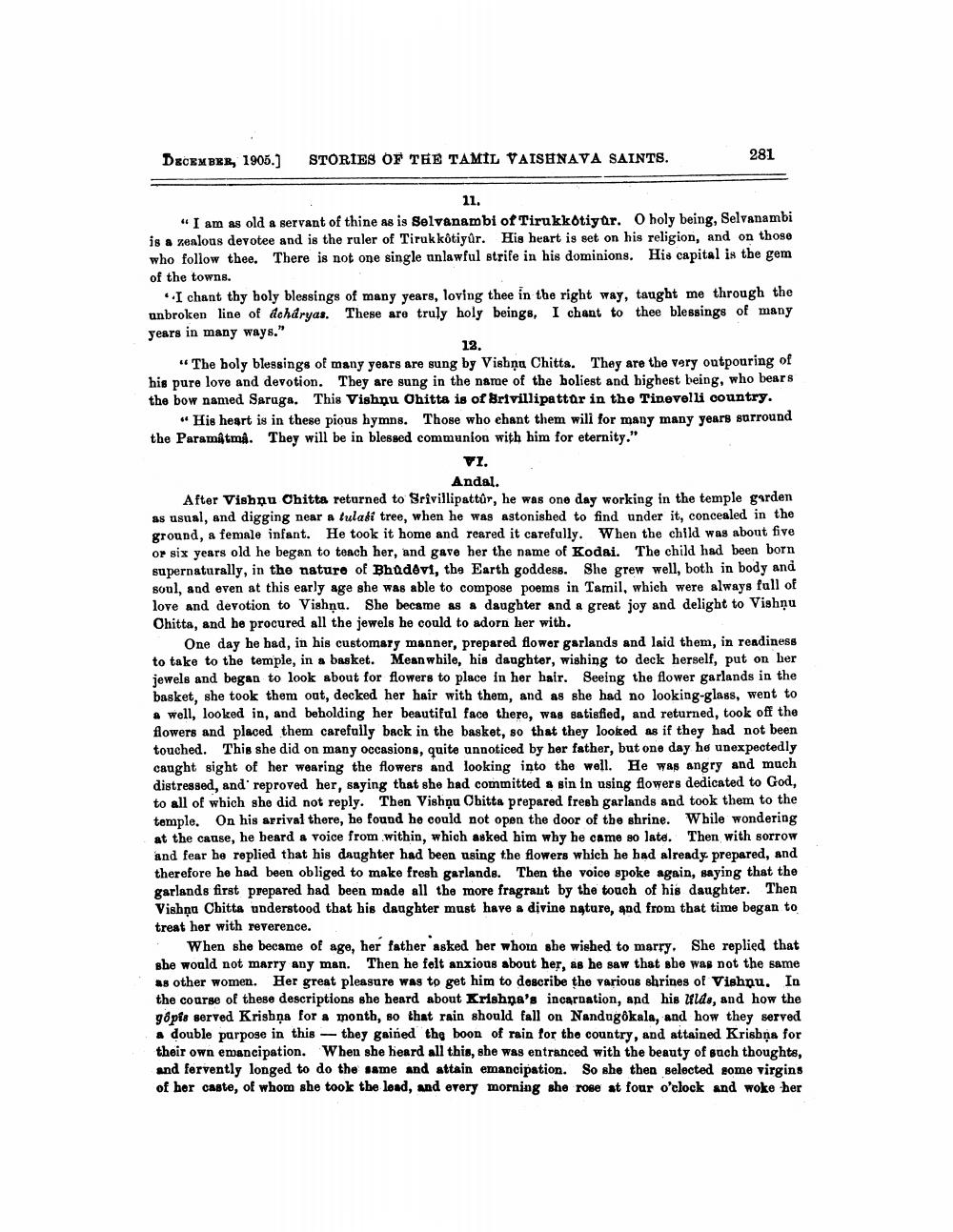________________
DECEMBER, 1905.]
STORIES OF THE TAMIL VAISHNAVA SAINTS.
281
11.
"I am as old a servant of thine as is Selvanambi of Tirukkotiyür. O holy being, Selvanambi is a zealous devotee and is the ruler of Tirukkôtiyûr. His heart is set on his religion, and on those who follow thee. There is not one single unlawful strife in his dominions. His capital is the gem of the towns.
I chant thy holy blessings of many years, loving thee in the right way, taught me through the unbroken line of doháryas. These are truly holy beings, I chant to thee blessings of many years in many ways."
12.
"The holy blessings of many years are sung by Vishnu Chitta. They are the very outpouring of his pure love and devotion. They are sung in the name of the holiest and highest being, who bears the bow named Saruga. This Vishnu Ohitta is of Brivillipattar in the Tinevelli country. Those who chant them will for many many years surround communion with him for eternity."
"His heart is in these pious hymns. the Paramatma. They will be in blessed
VI.
Andal.
After Vishnu Chitta returned to Srivillipattûr, he was one day working in the temple garden as usual, and digging near a tulasi tree, when he was astonished to find under it, concealed in the ground, a female infant. He took it home and reared it carefully. When the child was about five or six years old he began to teach her, and gave her the name of Kodai. The child had been born supernaturally, in the nature of Bhudevi, the Earth goddess. She grew well, both in body and soul, and even at this early age she was able to compose poems in Tamil, which were always full of love and devotion to Vishnu. She became as a daughter and a great joy and delight to Vishnu Chitta, and he procured all the jewels he could to adorn her with.
One day he had, in his customary manner, prepared flower garlands and laid them, in readiness to take to the temple, in a basket. Meanwhile, his daughter, wishing to deck herself, put on her jewels and began to look about for flowers to place in her hair. Seeing the flower garlands in the basket, she took them out, decked her hair with them, and as she had no looking-glass, went to a well, looked in, and beholding her beautiful face there, was satisfied, and returned, took off the flowers and placed them carefully back in the basket, so that they looked as if they had not been touched. This she did on many occasions, quite unnoticed by her father, but one day he unexpectedly caught sight of her wearing the flowers and looking into the well. He was angry and much distressed, and reproved her, saying that she had committed a sin in using flowers dedicated to God, to all of which she did not reply. Then Vishnu Chitta prepared fresh garlands and took them to the temple. On his arrival there, he found he could not open the door of the shrine. While wondering at the cause, he heard a voice from within, which asked him why he came so late. Then with sorrow and fear he replied that his daughter had been using the flowers which he had already prepared, and therefore he had been obliged to make fresh garlands. Then the voice spoke again, saying that the garlands first prepared had been made all the more fragraut by the touch of his daughter. Then Vishnu Chitta understood that his daughter must have a divine nature, and from that time began to treat her with reverence.
When she became of age, her father asked her whom she wished to marry. She replied that she would not marry any man. Then he felt anxious about her, as he saw that she was not the same as other women. Her great pleasure was to get him to describe the various shrines of Vishnu. In the course of these descriptions she heard about Krishna's incarnation, and his Wilde, and how the gopis served Krishna for a month, so that rain should fall on Nandugôkala, and how they served a double purpose in this they gained the boon of rain for the country, and attained Krishna for their own emancipation. When she heard all this, she was entranced with the beauty of such thoughts, and fervently longed to do the same and attain emancipation. So she then selected some virgins of her caste, of whom she took the lead, and every morning she rose at four o'clock and woke her




